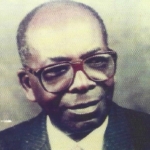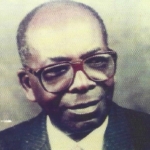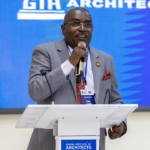
Tema Secondary School (Temascho) has hosted the fourth edition of the annual Dr F.K. Buah Memorial Lecture, with distinguished alumnus Anchorite Kennedy Gyenfi celebrating the legacy of the school’s founding headmaster and calling for a renewed national effort to shape the mindset of young people towards development.
Speaking before school authorities, students, alumni and invited guests, Mr Gyenfi expressed profound gratitude to the national leadership of the Tema Old Students Association (TOSA) for the honour of inviting him as guest speaker—an honour he described as “a great day” in his life, occurring exactly fifty years after he first stepped foot on the Temasco campus.
The lecture, themed “The Legacy of Dr F. K. Buah: Celebrated Historian, Eminent Educationist—Takeaways for Shaping the Mindset of the Youth Towards National Development,” traced the life, philosophy and national impact of Dr Francis Kwamina Buah, who founded Temascho in 1961 and became one of Ghana’s most revered historians and educationists.
Celebrating a visionary founder
Mr Gyenfi recounted Dr Buah’s extraordinary contributions as a teacher, administrator, author, cultural advocate and nation-builder. Born on 11 August 1922, Dr Buah rose from Twifo Mampong and Twifo Praso to earn a Double First-Class Honours degree in History and Economics from the National University College of Cork in Ireland in 1951, later obtaining a master’s degree in politico-economic history.
He taught at St Theresa’s Seminary at Amissano and later at Achimota School, before becoming founding headmaster of both St John’s School in Sekondi and Tema Secondary School.
His mastery of logic, history and educational leadership left an indelible mark on generations of Ghanaian students.
At Temascho, Dr Buah established a holistic model of education, introducing Latin, German, Logic and rigorous academic training that helped position the school as a top centre of secondary education in Ghana and West Africa. The Logic course, then unique in Africa at sixth-form level, was credited with giving Temascho students a strong advantage in university law and humanities programmes.
Mr Gyenfi also highlighted Dr Buah’s recruitment of brilliant Ghanaian and foreign teachers, the emphasis on moral training, meticulously organised Speech and Prize-Giving Days, and his insistence on discipline, academic excellence and confidence-building among students.
Role in WAEC, CHASS and National Education
Dr Buah’s influence extended well beyond the school. He served in senior capacities within the West African Examinations Council (WAEC) from the 1950s through the late 1970s—rising to Chief Examiner for O-Level and A-Level History and later becoming Vice-Chairman of the Council.
In 1993, WAEC conferred on him the “Distinguished Friend of the Council” award for his outstanding contributions.
He was also instrumental in the formation of the Conference of Heads of Assisted Secondary Schools (CHASS), which harmonised salaries and conditions of service for secondary school heads across Ghana.
Dr Buah later lectured at the University of Ghana, served on the University of Cape Coast Council and eventually became Chairman of the same council.
Prolific Historian and Cultural Advocate
As an author, Dr Buah wrote 18 history textbooks, including History for Ghana Schools, History of Ghana, and West Africa Since AD 1000, many of which shaped historical education across West Africa. Macmillan Publishers described him as “one of the bedrocks” of their African publishing success in the 1960s.
He championed historical truth and objectivity, often challenging Eurocentric distortions of African civilisation. His works highlighted the intellectual achievements of ancient African empires and urged students to use history as a guide to informed decision-making.
Mr Gyenfi emphasised that Dr Buah was a strong believer in tradition, culture and African symbolism, especially the iconic Sankofa symbol, which featured prominently in all his textbooks as a reminder of the importance of learning from the past to build the future.
Lessons for the Youth
Throughout the lecture, Mr Gyenfi urged current students—whom he repeatedly addressed as “My Dear Boys and Girls,” echoing Dr Buah’s affectionate phrase—to adopt the values their founding headmaster stood for: honesty, integrity, critical thinking, excellence and nationalism.
“Education is not merely acquiring knowledge,” he said. “It brings out the potentialities of human beings for the advancement of national development. The most valuable certificate is the unwritten one—one’s character and conduct.”
He argued that Dr Buah’s legacy provides powerful guidance for shaping the mindset of Ghana’s youth, particularly at a time when the nation requires disciplined, patriotic and ethically grounded citizens.
A Call to Preserve and Promote the F.K. Buah Legacy
Mr Gyenfi appealed for copies of his lecture to be placed in the school’s reference library and encouraged students to study the works of Dr Buah as part of understanding their school’s heritage and Ghana’s broader educational history.
He concluded with a call for renewed dedication to the ideals of national development, urging the youth to embrace discipline, hard work, critical thinking and cultural pride—principles that defined the life and work of Dr F.K. Buah.
The event also acknowledged previous speakers such as Dr Obeng, journalist Kwesi Pratt Jnr., and Professor Felix Takrama, who delivered earlier editions of the annual lecture series.
- President Commissions 36.5 Million Dollars Hospital In The Tain District
- You Will Not Go Free For Killing An Hard Working MP – Akufo-Addo To MP’s Killer
- I Will Lead You To Victory – Ato Forson Assures NDC Supporters
Visit Our Social Media for More



